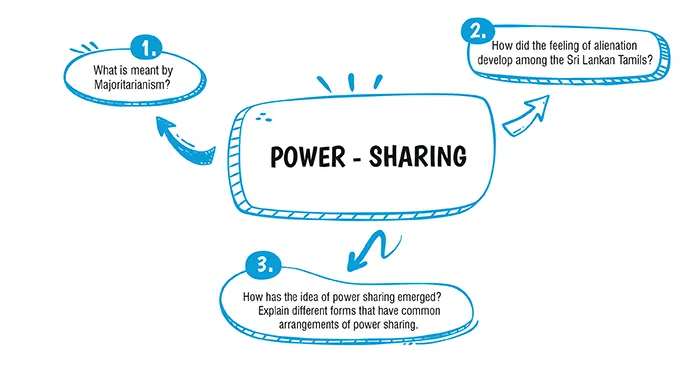Home / Boards / CBSE / Important Questions / Class 10 / Social Science / Power Sharing
Table of Contents

Ans. (c)
Explanation:
Sri Lanka has two major social groups, Sinhalese and Sri Lankan Tamils. People who speak Sinhala are known as the Sinhalese. People who speak Tamil are the Sri Lankan Tamils.
Ans.(c)
Explanation:
Sri Lankan Tamils constitute an overwhelming majority of the population in the Northern Province and are the largest ethnic group in the Eastern Province.
Explanation:
The belief of the majority community is that they should be able to rule a country in whatever way they want by disregarding the wishes of the minority, this is called Majoritarianism.
Explanation:
The measures of the act of 1956 introduced by Sinhalese Government made the Sri Lankan Tamils feel alienated. They felt that none of the major political parties led by the Buddhist Sinhalese were sensitive towards their language and culture. They also felt that the constitution and policies of the government denied them equal political rights, discriminated against them in terms of jobs and other opportunities by ignoring their interests.
Explanation:
Power sharing has emerged as a strong substitute to the idea of undivided political power, which believed in giving power to one person or a group of people located in one place. The core principle of power sharing is that people are the source of all political powers. Common forms of power sharing are:
(i) Vertical division of power : The sharing of power can be done at different levels of the government – a central government for the entire country and governments at provincial or regional level. This type is usually called the federal government.
(ii) Horizontal division of power : In this form, the power is divided among different organs of the government, such as legislature, the executive and the judiciary. It places different organs of the government at the same level.
(iii) Power is also shared among different social groups such as religious and linguistic groups, e.g. community government.
(iv) Various power sharing arrangements can also be seen in the way political parties, pressure groups and movements control or influence those in power.
| Chapter No. | Chapter Name |
|---|---|
| History | |
| Chapter 1 | The Rise of Nationalism in Europe |
| Chapter 2 | Nationalism in India |
| Chapter 3 | The Making of a Global World |
| Chapter 4 | The Age of Industrialization |
| Chapter 5 | Print Culture and the Modern World |
| Geography | |
| Chapter 6 | Resources and Development |
| Chapter 7 | Forest and Wildlife Resources |
| Chapter 8 | Water Resources |
| Chapter 9 | Agriculture |
| Chapter 10 | Minerals and Energy Resources |
| Chapter 11 | Manufacturing Industries |
| Political Science | |
| Chapter 12 | Power – sharing |
| Chapter 13 | Federalism |
| Chapter 14 | Gender, Religion and Caste |
| Chapter 15 | Political Parties |
| Chapter 16 | Outcomes of Democracy |
| Economics | |
| Chapter 17 | Development |
| Chapter 18 | Sectors of the Indian Economy |
| Chapter 19 | Money and Credit |
| Chapter 20 | Globalization and The Indian Economy |
| Chapter Wise Important Questions for CBSE Board Class 10 Political Science |
|---|
| Power – sharing |
| Federalism |
| Gender, Religion and Caste |
| Political Parties |
| Outcomes of Democracy |
CBSE Important Questions Class 10
ICSE Important Questions Class 10
CBSE Important Questions Class 10
ICSE Important Questions Class 10